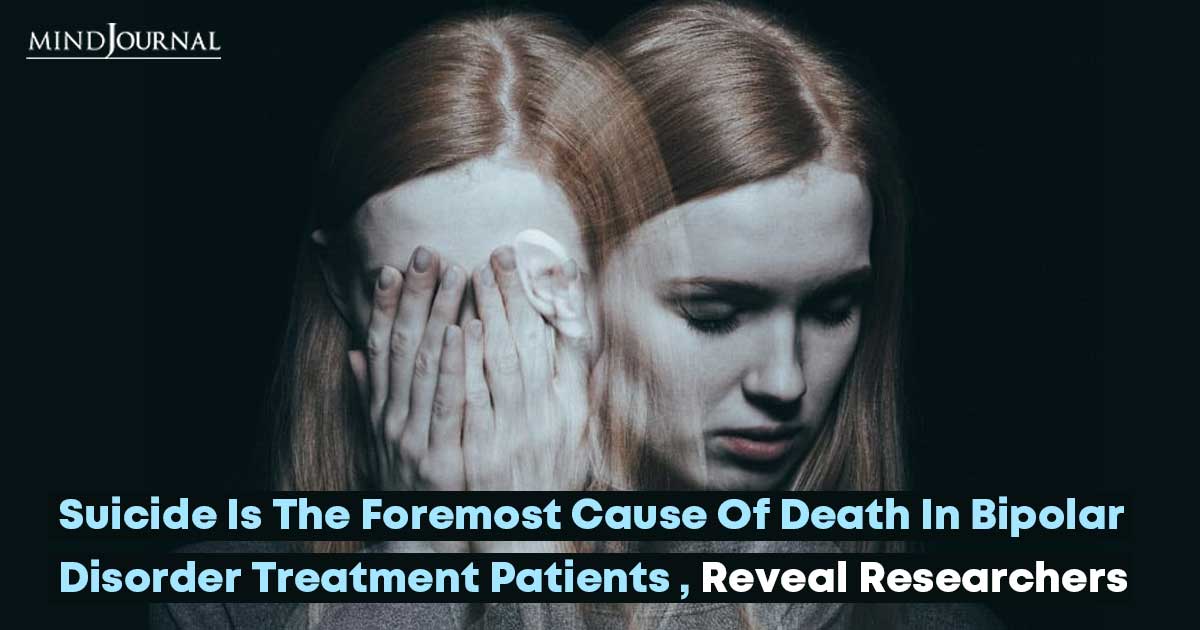Despite the contention that psychiatric treatment effectively reduces suicide rates in individuals with bipolar disorder (BD), recent research reveals that suicide in bipolar disorder treatment patients remains the primary cause of death among this group, even after receiving treatment.
Furthermore, contrary to the belief that those who die by suicide are often not taking their prescribed medications, the researchers say that 48% of suicide cases in this population are the result of overdosing on psychiatric drugs.
Why Suicide In Bipolar Disorder Treatment Patients Is The Primary Cause Of Death?
The study encompassed 47,018 individuals diagnosed with bipolar disorder, meticulously identified through a comprehensive Finnish nationwide registry that cataloged those who underwent extensive treatment for BD, comprising both inpatient hospitalizations and outpatient care.
The study cohort consisted of participants diagnosed with bipolar disorder between 1998 and 2018, falling within the age range of 15 to 65 years from 2004 to 2018. The median duration of follow-up was approximately eight years.
Over the course of the research, a total of 3,300 individuals (7% of the cohort) experienced mortality.
Among the various causes of death, suicide stood as the most prevalent, accounting for 740 fatalities, with 48% (353 individuals) of these suicides being attributed to overdosing on psychiatric drugs.
Additionally, the data identified 265 deaths categorized as “accidental poisonings,” of which 46% (123 deaths) were attributed to overdosing on psychiatric drugs.
Notably, there remains ambiguity regarding whether a subset of the deaths designated as “accidental poisonings” could potentially be reclassified as “suicides,” considering the tendency for societal stigma to lead to suicide cases being recorded as unintentional suicide in Bipolar Disorder treatment incidents in official records.
Read more here: Alarming Surge: Alcohol Related Deaths Among Women On The Rise, New Study Finds
The second most frequent cause of death was linked to alcohol-related factors, encompassing 595 fatalities. This category included instances of alcohol-related liver disease, alcohol poisoning, and alcohol dependence.
Furthermore, cardiovascular disease (CVD) accounted for an additional 552 deaths.
Research findings indicated that individuals under antipsychotic treatment faced a more than threefold heightened risk of succumbing to CVD, even after meticulous adjustment for confounding variables.
Notably, those utilizing a combined bipolar disorder treatments regimen of phenothiazine-type antipsychotics and antidepressants exhibited a staggering 18-fold increase in the risk of CVD-related mortality compared to the general population.
Common Causes Of Death In Bipolar Disorder Treatment
Suicide: Despite treatment, suicide remains a significant risk for individuals with bipolar disorder.
Accidental Overdose: Overdosing on psychiatric medications can occur, leading to fatal outcomes.
Cardiovascular Disease: Some medications used in bipolar disorder treatment may increase the risk of cardiovascular issues.
Substance Abuse: Co-occurring substance abuse disorders can lead to health complications and overdose.
Read more here: 3 Powerful Pointers That Will Help In Preventing Substance Abuse
Other Health Conditions: Individuals with bipolar disorder may be at an increased risk of other physical health problems, such as diabetes and obesity, which can contribute to premature death.

It’s important to emphasize that effective treatment, support, and monitoring can significantly reduce the risk of common causes of death in bipolar disorder treatment.
On multiple occasions, researchers have observed that individuals diagnosed with severe mental illnesses commonly experience a lifespan that is notably shorter by several decades compared to the general population.
Despite notable advancements in treatment accessibility, a recent investigation conducted in the United Kingdom highlights that this divergence in mortality rates, referred to as the “mortality gap,” continues to expand.
The present researchers propose a reorientation of focus within psychiatry towards the prevention of substance abuse and suicidal tendencies.
However, it’s important to note that they refrain from elaborating on the particular distinctions between these new priorities and the existing bipolar disorder treatments objective.









Leave a Reply
You must be logged in to post a comment.